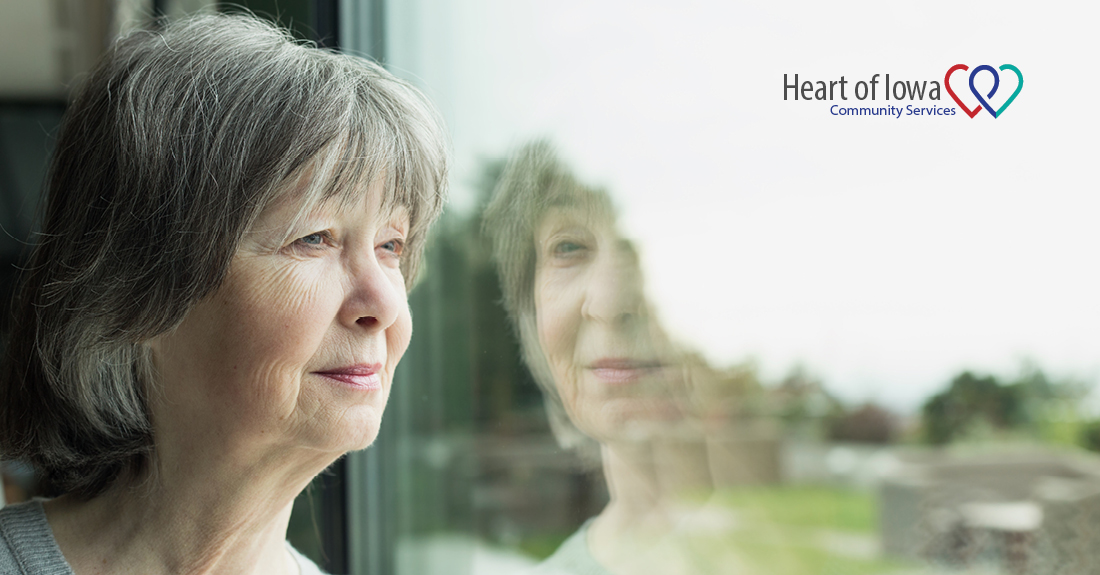
Aging is a part of life, but experiencing depression as we age doesn’t have to be.
At Heart of Iowa Community Services, we believe in empowering older adults — those over the age of 65 — and their families with knowledge and resources to navigate the unique challenges this generation faces and promote mental health services.
Understanding depression is a crucial step toward seeking help and finding strategies for recovery. Taking action in addressing the causes of depression for older people and minimizing symptoms can improve an individual’s overall life experience, reduce health care costs and foster more compassionate relationships throughout our communities.
Understanding depression is a crucial step toward seeking help and finding strategies for recovery. Taking action in addressing the causes of depression for older people and minimizing symptoms can improve an individual’s overall life experience, reduce health care costs and foster more compassionate relationships throughout our communities.
Why Depression Is Common in Older Adults
Older adults experience stressors and face challenges often distinctive to their age group, like decreased functional ability, reduced mobility, chronic pain, financial issues related to retirement or health care, elder abuse, loneliness and bereavement. Though these as individual occurrences can cause bouts of sadness or gloomy feelings, having multiple and prolonged challenges can lead to a sense of hopelessness and ultimately depression.
While the Centers for Disease Control and Prevention (CDC) shares most older adults are not clinically depressed, the likelihood of developing depression increases as a person’s environment becomes more secluded and offers less potential for activity.
The CDC estimates the following percentages of major or clinical depression in older adults:
- 1%–5% for older adults living in the general community.
- 5% for older adults who are hospitalized.
- 5% for older adults who require home health care.
The percentages may feel small, but when you think about them in terms of people, especially people you care about — maybe even yourself — who are experiencing this debilitating mental health disorder, it becomes staggering.
How To Recognize the Signs of Depression
Depression is a common and serious mental health condition characterized by persistent and intense feelings of sadness and despair. It can affect a person's thoughts, emotions and physical ability.
Common symptoms of depression include:
- Loss of pleasure or enjoyment in everyday activities.
- Rapid weight gain or loss due to a change in appetite.
- Low-quality sleep.
- Inability to focus.
- Self-isolation.
These and other symptoms can severely limit one’s quality of life and ability to care for themselves. It can also lead to severe physical health problems and slow the rate of recovery from other illnesses. In addition, depressed people are at a greater risk for suicidal thoughts and actions.
In our September blog, we shared how suicide is a significant concern for a variety of reasons that speak to the place and time where this population is in life. If you or someone you know is having thoughts about suicide or self-harm, immediately contact a person you trust, like a health care provider, or call 988. You can also call 844-428-3878 for mobile crisis services and have a team of professionals visit wherever you are in an unmarked vehicle. You’re not alone — help is available.
Like anxiety, depression is a complex disorder that may require treatment and support to manage effectively.
Mental Health Care Strategies for Older Adults and Their Caregivers
The essentials to good overall health and well-being are always brought back to nutrition, physical activity and quality sleep. To further support older adults who are not yet in need of medical intervention, the following considerations can be made to adjust an older adult’s lifestyle to prevent the onset of or minimize current symptoms of depression.
- Mindfulness and Stress Management: Techniques such as meditation, deep breathing and relaxation exercises can help older adults manage stress and reduce the risk of depression. When practiced regularly, these can promote emotional resilience and improved brain health. In addition, consistent communication with older adults in your family or friend group can ease loneliness and bring a sense of connection. Encourage them to express their feelings, fears and concerns.
- Medication Management: For older adults who require medication, having a clear understanding of the medications, potential side effects and management supported by health care professionals is essential. Knowing the impacts medication can have on mood and depression symptoms allows for a better awareness of what can be changed when experiencing these symptoms.
- Engagement in Hobbies: Isolation is a significant contributor to depression among older adults. Encourage them to pursue hobbies and interests. Engaging in activities can boost their mood and sense of purpose. Attending club meetings, volunteering or being with friends and family at local events can also provide people at any age with a sense of belonging.
- Physical and Mental Stimulation: Puzzles, reading and learning new skills or languages can help maintain cognitive function and emotional well-being. Plan regular outings to keep active and engaged. Even short walks or visits to a local museum can be invigorating.
Seek Local Help and Support To Minimize Depression Symptoms and Risks
Being aware of and understanding how to identify depression early can help older adults and their families seek out the right interventions.
If depression is suspected, seek support and remember you’re not alone. Heart of Iowa has a way for you to find everybody who can help, all in one place. Download the Resource Guide to determine which organizations and resources are nearby and right for you or your family member. If you need help with funding or finding the right services, contact your local Heart of Iowa location. We are eager to get you connected to the services it takes to help Iowans get back on track for a healthier, happier life.
